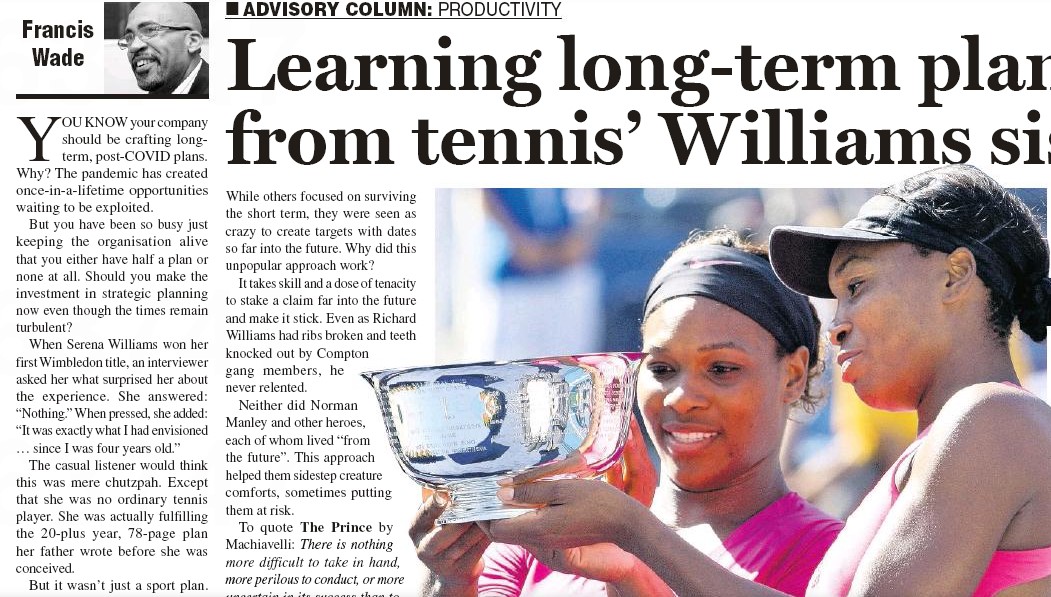You know your company should be crafting long-term, post-COVID plans. Why? The pandemic has created once-in-a-lifetime opportunities waiting to be exploited. But you have been so busy just keeping the organization alive that you either have half-a-plan, or none at all. Should you make the investment in strategic planning now even though the times remain turbulent?
When Serena Williams won her first Wimbledon title, an interviewer asked her what surprised her about the experience. She answered – “Nothing.” When pressed, she added, “It was exactly what I had envisioned…since I was four years old.”
The casual listener would think this was mere chutzpah. Except that she was no ordinary tennis player. She was actually fulfilling the 20+ year, 78 page plan her father wrote before she was conceived.
But it wasn’t just a sport plan. The document covered Venus and Serena’s education, faith, family, responsibility, money…all aspects of their lives. It even inspired Naomi Osaka’s Haitian father to coach his daughter to the number one spot decades later.
Remarkably, the three champions have earned over US$180 million in their careers on the court. While some consider it to be all a matter of talent, the two coaches disagree. The success their daughters enjoy is due to advanced planning.
Like GraceKennedy’s 25-year plan and JMMB’s 23-year strategy, they were able to programme and accumulate small gains over time. While others focused on surviving the short-term, they were seen as crazy to create targets with dates so far into the future. Why did this unpopular approach work?
- Back from the Future
It takes skill and a dose of tenacity to stake a claim far into the future and make it stick. Even as Richard Williams had ribs broken and teeth knocked out by Compton gang members, he never relented.
Neither did Norman Manley and other heroes, each of whom lived “from the future”. This approach helped them sidestep creature comforts, sometimes putting them at risk.
Quote: “There is nothing more difficult to take in hand, more perilous to conduct, or more uncertain in its success, than to take the lead in the introduction of a new order of things.” The Prince, by Machiavelli.
But those who do come from the future inspire themselves to make changes. They declare a stated vision and live from it. This makes them two-headed: able to live today, and in the future at the same time.
- Detailed Planning in Reverse
If your organization’s executives shy away from putting themselves in harm’s way, it could be a lack of courage. But it may also come from the lack of detailed planning.
While most teams know how to spout vacuous vagaries to be “world-class,” they rarely have a 20-year plan to do so. The shortage of specificity lets them off the hook.
But the truth is, there are numerous ways to craft detailed multi-year plans which work, even without a shred of college education (i.e. like Richard Williams.)
One method successful companies use is to:
a. Convert the vision for 15-30 years away into details to be accomplished by a set deadline.
b. Translate qualitative details into an array of metrics.
c. Backcast metrics from the target year to today.
d. Schedule staggered projects to drive the metrics.
These techniques are challenging to employ during an offsite meeting. But the detailed plan produced can galvanize an entire company because of its credibility.
- Stand Alone
In retrospect, Williams argued that he needed a meticulous plan due to the uncharted waters he was navigating. No-one had ever done the impossible.
Furthermore, the role models in the sport at the time were succeeding wildly following the traditional approach. He refused to follow their lead, causing many to accuse Williams of ruining his daughters’ prospects. “Stop being selfish,” they said.
In retrospect, his wisdom is apparent. Countless others have entered the women’s tennis circuit and burned out. Only a tiny handful have played as long as the sisters have.
Some say it’s all a result of the Williams’ “character”.
Again, he argues differently. While his family has lots of it, he says that having a clear plan helped them weather and repel the criticism of experts who publicly questioned his sanity.
In other words, a good plan helped the family to stay the course. They found it easy to decide next steps – simply stick to the plan. After all, it was easier to do so than develop the “character” needed.
In this context, families are just like organizations. There’s no plausible reason to put off long-term planning if your company is committed to high performance. Instead, take the challenge seriously and accomplish the impossible.

